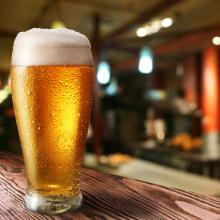beer
SOBER SPIRITUALITY by Erin Jean Warde is ultimately an invitation for readers to ask themselves, “How do I want to be in a relationship with alcohol?” Warde, an ordained Episcopal priest, spiritual director, and sobriety coach, asked this question of herself years ago. She ultimately chose sobriety but realizes that won’t be where everyone lands. And Warde also wants the whole church, not just individuals, to engage this question.
Because, according to Warde, the church’s current relationship with alcohol is pretty toxic — especially in progressive churches. Progressive denominations often work to distinguish themselves from fundamentalism and much of white evangelicalism, communicating, “Yes, we’re Christian, but not that type of Christian” — not the type that is hostile to immigrants and bars women and LGBTQ people from the pulpit.
But one of the ways progressive churches have signaled this distinction, Warde argues, is harmful: “by illustrating how much they drink or that they drink at church.” Events like “Beer & Hymns” or “Theology on Tap” come to mind. This type of laid-back programming quickly communicates to newcomers that the host church isn’t dogmatic or old-fashioned. But it sends a different message to people who are sober or sober curious. “The common refrain of ‘all are welcome’ must ring true when a person changes their relationship with alcohol,” Warde writes.
The Archdiocese of St. Louis is putting an end to alcohol sales at youth-related events.
Under a new policy that goes into effect Friday, drinking will not be allowed at any event that is directed primarily toward minors.
That means parents will no longer be allowed to throw back a few beers during their kids’ soccer, volleyball, and softball games. And athletic associations will no longer rake in revenue from beer sales at their concession stands.
A few months ago, Stephen Marsh, my fellow pastor, and I walked into Chief’s Tavern on the east side of Madison, Wis., ordered a couple pints, sat on a pair of stools and discussed an idea that would eventually have a massive impact on the congregation we serve together. In specifics, we wondered whether we could spark a ministry by fusing two of our most treasured Lutheran traditions: beers and hymns.
The budding idea, which originated from some creative faith communities in other parts of the country, was to find a local tavern willing to host a monthly one-hour session of hymn-inspired evening fellowship. Within a few minutes of our conversation, we were joined by Brian Mason (owner of Chief’s Tavern), and what followed was a ground-breaking partnership between parish and pub. The first Beers & Hymns event was scheduled, and as the date drew closer, our collective thoughts and prayers moved back and forth between “Thanks be to God” and “Lord, have mercy”!
A new map has divided the country into red and blue ... but this one has nothing do do with politics or the upcoming election. No, we're not talking Republicans or Democrats; we're talking Church or Beer. (Do the two have to be mutually exclusive? What if you're Lutheran?)
FloatingSheep.org compiled geotagged Tweets from June 22 - 28 comparing the geographic concentration of convos regarding church and beer.
As we attended workshops and concerts, met new people, and tried to make sense of the larger impact this gathering might have beyond us, we kept coming back to that statement we heard early on about Walter Wink. What is Christian imagination? How do we imagine Christianity? Whatever it means, imagining Christianity is exactly what happened at Wild Goose.
Here's an example: Throughout the weekend, Fullsteam, a craft brewery in nearby Durham owned by an alumnus of Wheaton College (yes, that Wheaton) sold selling beer to quench the thirst of Goosers during late night sessions and performances (a la Homebrewed Christianity, etc.). And on Saturday afternoon — call it an early evening happy hour — a group of rag-tag musicians, armed with a few folk instruments, a trumpet and percussion, led a jolly crowd of more than 100 in Sunday School choruses and old-timey spirituals. They called it, “Beer and Hymns."
There, caught up in a holy wind of hops and hope, we reimagined what church might be during an ad hoc version of “He’s got the Whole World in His Hands.” We the motley worshippers alternated “He’s got the whole world” with “She’s got the whole world,” proudly singing at the top of our lungs, “She’s got the liberals and conservatives / the gays and straights / and a big ole mug of beer/ in her hands.”
Benjamin Franklin, pointing to the story of Jesus turning water into wine, acknowledges the miracle of the processes of nature itself, taking natural sugars and recombining them into an (ahem) intoxicating elixir that has been a staple of global culture for millennia.
And then the religious folks came along and tried to ruin the fun for everyone. Having grown up Baptist, I heard some of my fellow faithful proclaim the evils of demon alcohol, though their warnings seemed to do little to stem folks’ drinking, aside from pushing them to do it more privately. Then I met some Anglican and Jewish friends who appreciated the fruit of the vine around the dinner table. I was shocked – and more than a little intrigued – when I saw kids under the age of 21 taking part in the ritual wine drinking as part of a Jewish Seder meal, and I was in awe when I realized some churches used real wine in their worship services.
So which is it? Is alcohol the lynchpin of the decline of civilization, or is it a sacrament, not only to be enjoyed, but to be held up as a gift from the Almighty?




